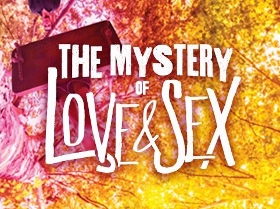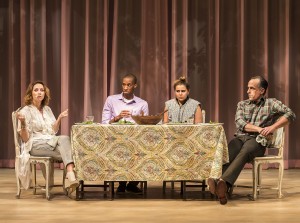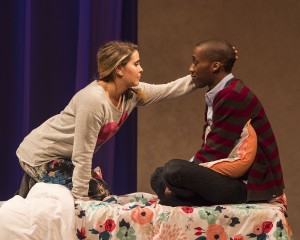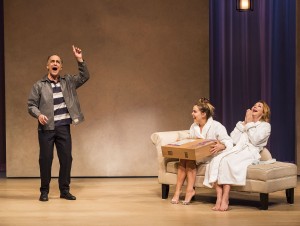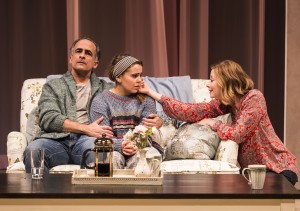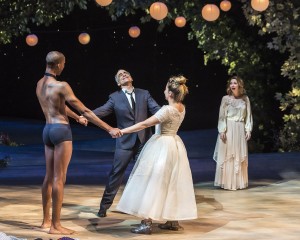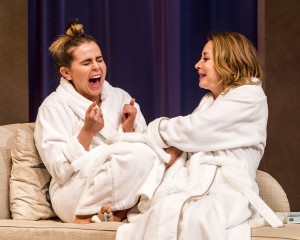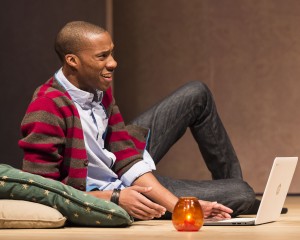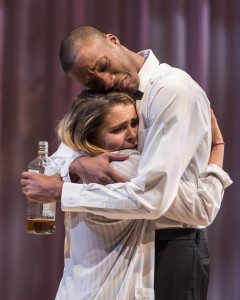TOWARD A SAFE THEATER
In 2015 Bathsheba Doran’s The Mystery of Love & Sex opened to mixed notices Off Broadway, which seems to be the exact pipeline for shows to get produced at L.A.’s Mark Taper Forum a year or so later. It fits the bill for new-millennial regional theater production in pretty much every way:
- the characters are all blithely complex liberals
- there’s funny banter among these literate people, all of whom went to college
- in fact, half the characters are writers
- there’s an interracial relationship
- it’s totally okay with everybody that there’s an interracial relationship
- characters don’t want to admit they’re gay
- it’s totally okay with everybody else that they’re gay
- it’s mentioned that it’s totally okay that some people are transgender even though, in this play, nobody is
- jokes about how black people are good dancers are not okay except when this play makes them
- Jew jokes are okay, too, apparently.
- Black jokes, no.
- NO.
- college kids are more politically evolved than their parents
- or are they?
- college kids don’t know everything yet, though
- parents don’t, either, despite having gathered wisdom over the years, yes they have, seriously, listen up
- parents can be a little racist
- parents can get upset about being called on their slight racism
- kids who call them on it are clearly backed up by the playwright because even a little unconscious racism, you know, that’s no good
- parents’ marriages are often on the rocks
- an old person dies and nobody cares
- another old person dies, but she’s black, so everybody cares, and the hideous muzak soundtrack is punctuated by a token gospel vocal during a scene change
- young, attractive people have to get naked – one male, one female; fair is fair
- religion is mocked, but gently, and it’s clear that the playwright, the venue, the enlightened universe would never condone real-life mockery of anyone’s thoughts or feelings
- characters who profess religious tendencies abruptly lose them, so who cares
- people wear bathrobes during the poignant moments
- nothing that happens makes any dramatic difference
- nothing has any consequence beyond making people yell
- everybody eventually gets over the stuff that bothered them
- an old person is shocked by the shenanigans of the young people
- nobody cares about that, either
- a scene takes place in which one of the characters talks to another on Skype
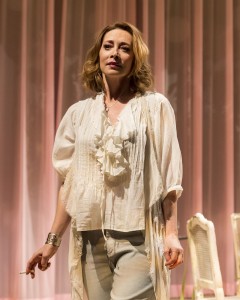 Wealthy marrieds Howard and Lucinda go up to have dinner with their daughter Charlotte at the college to which she pursued her black boyfriend Jonny, foregoing the Ivy League education she could have had. David Pittu and Sharon Lawrence are funny and sharp as the father and mother; dad indulges in unconscious privilege, making disparaging elitist remarks about the food, the seating arrangements, race, class. Mom tries to give up smoking, but her heart’s not in it. After five minutes, I really liked this play and wondered what it would be about.
Wealthy marrieds Howard and Lucinda go up to have dinner with their daughter Charlotte at the college to which she pursued her black boyfriend Jonny, foregoing the Ivy League education she could have had. David Pittu and Sharon Lawrence are funny and sharp as the father and mother; dad indulges in unconscious privilege, making disparaging elitist remarks about the food, the seating arrangements, race, class. Mom tries to give up smoking, but her heart’s not in it. After five minutes, I really liked this play and wondered what it would be about.
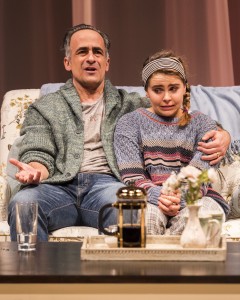 Later, after her parents leave, the girl mentions a flirtation with a female classmate and then tries unsuccessfully to seduce the boy. He seems to disagree with her about whether they’re dating and is pointedly uninterested in sleeping with her, even encouraging her to have sex with the other girl. That scene left me a little less at sea about where things were going but no less confused as to how it would all fit together. The writing had also become quite a bit less compelling. York Walker and Mae Whitman are just fine as the kids, although a little vocal modulation would do Whitman a lot of good; Rui Rita lights them nicely in Laura
Later, after her parents leave, the girl mentions a flirtation with a female classmate and then tries unsuccessfully to seduce the boy. He seems to disagree with her about whether they’re dating and is pointedly uninterested in sleeping with her, even encouraging her to have sex with the other girl. That scene left me a little less at sea about where things were going but no less confused as to how it would all fit together. The writing had also become quite a bit less compelling. York Walker and Mae Whitman are just fine as the kids, although a little vocal modulation would do Whitman a lot of good; Rui Rita lights them nicely in Laura 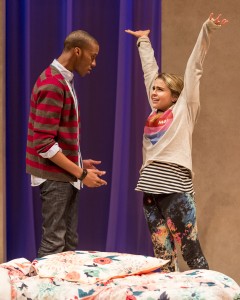 Bauer’s pleasant costumes.
Bauer’s pleasant costumes.
Despite its aggressive geniality, by intermission I didn’t much like the play, and I wondered if I would ever find out what it was about. Then it hit me that Karl Fredrik Lundeberg’s music and Takeshi Kata’s sets are equally bland, both unnecessarily busy, both offensively inoffensive. My epiphany: this show’s about pleasing all of the theatergoers all of the time.
It’s the kind of narrative that drags across years rather than invest in moments of tension and revelation. It’s the kind of writing and directing that presumes political alliance with its audience, that wants to pique and alarm you but not very much, that would have its free-trade cake and eat it by avoiding an actual story to focus on characters’ personal growth via trials we hear about after the fact. It’s a production packed with long silences, in which everybody feels instead of doing. It is the safest possible art, sugarless, tasteless humanism iced with smugness. If this show were a party guest, you’d put it in the kitchen and make it explain which hors d’oeuvres contained peanuts and dairy. Everyone would be polite to it, and nobody would like it very much or want to talk to it. It would go home alone.
The Mystery of Love & Sex
Center Theatre Group
Mark Taper Forum
Music Center, 135 N. Grand Ave
ends on March 20, 2016
for tickets, call 213.628.2772 or visit CTG
